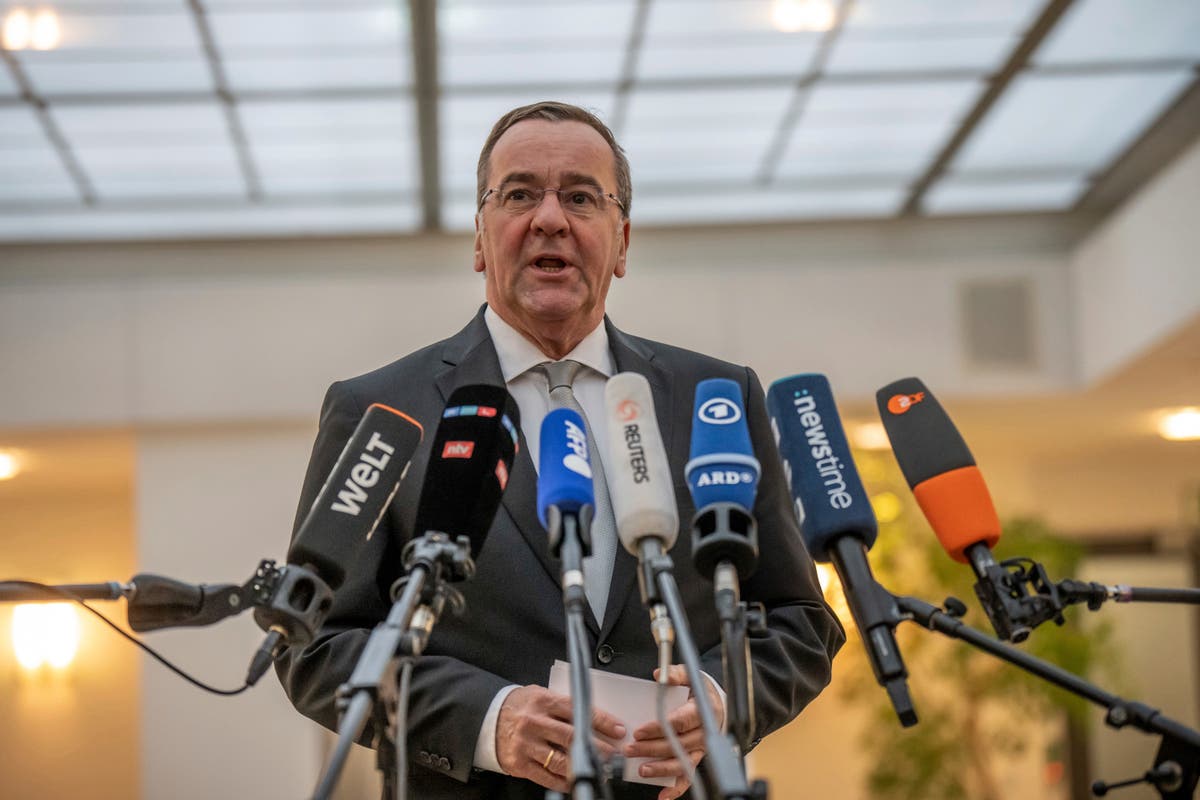A German military leak that revealed to Britain had people “on the ground” in Ukraine was intercepted by Russia after a “mistake” by a top-secret conference call participant from Asia who used an unsecure line.
Germany’s defence minister, Boris Pistorius, has also claimed that Moscow is likely to have tapped into the call not through a spy or targeted surveillance, but by widespread monitoring.
Speaking on Tuesday morning, he said that the unnamed military officer had called in from Singapore where an air show with other high-ranking European military officials was taking place – and then dialled into the WebEx call using either his mobile phone or the hotel’s Wi-Fi but not a secured line as is considered mandatory for such calls.
“For the Russian secret services, it was a real find… Targeted hacking took place in the hotels used across the board,” Mr Pistorius said. “It must therefore be assumed that the access to this [phone] conference was a chance hit as part of a broad, scattered approach.” The defence minister said there was no spy on the call.
“Our communication systems have not been compromised,” he said. “The reason the air force call could nonetheless be recorded was because of an individual’s operational mistake.”
German Defence Minister Boris Pistorius insisted his country’s communications systems had not been compromised
(AFP via Getty Images)
The use of WebEx for the call was authorised, he said, noting it was not the off-the-shelf software but a specially-certified one with servers in the Bundeswehr’s computing centres in Germany.
Mr Pistorius said the investigation was ongoing, overall security had been increased and preliminary disciplinary proceedings against the officer were being considered, but that severe personal consequences were unlikely.
“I will not sacrifice any of my best officers to Putin’s games, to put it very clearly,” he said, referring to Russian president Vladimir Putin.
The minister’s statement appeared to be a bid to provide reassurance to Germany’s allies amid the huge embarrassment over the leaked audio recording, which was first released by the editor of Kremlin-controlled news channel RT on Friday.
The 38-minute conversation from a fortnight ago captured the head of the Luftwaffe discussing Britain’s involvement in Ukraine on deploying long-range Storm Shadow missiles against targets up to 150 miles into Russia.
“When it comes to mission planning,” Lt Gen Ingo Gerhartz says, “I know how the English do it, they do it completely in reachback. They also have a few people on the ground, they do that, the French don’t.”
Reachback is military jargon for obtaining equipment that is not on the battlefront.
The audio recording also included the senior officers appearing to discuss how Taurus missiles from Germany could be used to target the Kerch Bridge connecting Russia with occupied Crimea.
A key point to the war in Ukraine for Russia is its fight against the ‘collective West’, not just Kyiv
(via REUTERS)
The conversation was held over a platform called Webexm with the authorised call made using certified services in Germany, said Mr Pistorius.
Speaking on Tuesday, Mr Pistoirus said Germany would take technical and organisational measures to ensure such a leak could never happen again. And amidst growing concern from other Western countries, he said he had spoken with Allies, who said trust in Germany remained unbroken.
The UK’s foreign secretary, David Cameron, is travelling to Berlin on Thursday, when the topic is likely to come up. But on Monday, a spokesperson for prime minister Rishi Sunak that the leak was a “very serious matter”, adding it was for the German authorities to investigate.
They added: “The UK was the first on our part to provide long-range precision strike missiles to Ukraine, and we would encourage our allies to do the same.
“We’ve been clear from the outset that the UK will provide Ukraine with the necessary aid, including lethal support, to defend itself and reclaim its sovereign territory.”
However, Conservative MP Tobias Ellwood, former chairman of the Commons Defence Committee, described the leak as “worrying on a number of levels”, while questioning why “basic concept protocols” weren’t followed on the call.
And Germany’s former intelligence chief, August Hannin warned more Nato secrets could have been obtained following the leak. He told Germany’s Bild newspaper: “This leak could have been just the tip of the iceberg.”
Reacting to the audio call, the Kremlin spokesperson, Dmitry Peskov, said it proved “the direct involvement of the collective West in the conflict in Ukraine”. However, Mr Sunak’s spokesperson said “it is clearly in the Kremlin’s interest to propagate misinformation”.
They also declined to comment on UK operations in Ukraine beyond saying there was a “small number of troops” providing protection for British diplomats and training for Ukrainian forces.
Former Army chief Lord Dannatt said those responsible for the leak from the 38-minute call should be “censured pretty heavily”.
Mr Dannatt, who also said he could not comment on British forces in Ukraine, told Times Radio: “I was very disappointed to read that story. I think the German air force officers who were talking on an open line, frankly, should be censured pretty heavily.”
Associated Press contributed to this report








